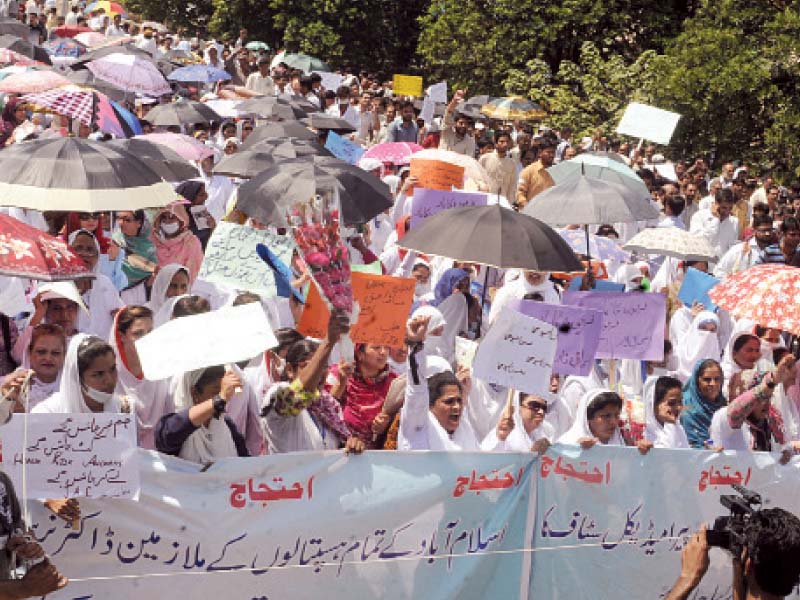
At least 20 doctors and paramedical staff sustained injuries as they clashed with police during a protest against freezing of their health risk allowance.
The police baton-charged the protesters as they tried to march towards the Prime Minister’s Secretariat through Nadra Chowk.
At least 12 protesters were arrested.
Three of the injured, including a senior doctor, Sharif Astori, were admitted to surgical intensive care unit of the Polyclinic hospital.
Federal public hospital employees were trying to stage a sit-in at the Prime Minister’s Secretariat. They have been protesting against freezing of their health risk allowance for the last one month.
The government had frozen the allowance from July 30, 2015.
Out-patient departments at the Pakistan Institute of Medical Sciences, Polyclinic, CDA Hospital, National Institute of Rehabilitative Medicine (NIRM), and National Institute of Health were closed due to the protest. Emergency services, however, remained functional.
The doctors and paramedics wore black armbands and chanted slogans against the government. They said the allowance was their basic right as they faced risk of contracting communicable diseases from patients and radiations emitting from medical equipment.

Patients suffer
Thousands of patients visiting the out-patient departments had to suffer as the hospital staff was out on the street.
Nasira Bibi, 65, had come all the way from Chakwal to see a doctor in the cardiology at Polyclinic. She wondered why all the rooms were locked and there was no doctor to attend to her. She was in a wheelchair being pushed by her 35-year-old daughter Shaista Bibi.
“We cannot afford to go back and come again because of my mother’s poor health and financial issues,” Shaista said. She said they did not have any relatives in Islamabad, with whom they could stay overnight. She said they would spend the night at a bench in the hospital hoping doctors would return the next morning.
Another patient Saima Hussain, who was seven-months pregnant, was sitting helplessly at the Polyclinic entrance. She had come from Bhara Kahu to see a doctor. She said she would return the next day but it was not easy for her to travel in inconvenient public transport vans. “No matter what, the poor always suffer in this country,” she remarked.
Inpatient departments were also short of doctors and nurses as many joined their colleagues on the streets.
Govt unmoved
The government had sent no representative for talks when this report was filed.
Minister of State for Capital Administration and Development Division (CADD) Usman Ibrahim said though the hospital staff were CADD employees the issue emanated from the Finance Division, which was responsible to solve it. “The allowance has not been stopped permanently. It has just been frozen for now,” said Ibrahim.
The minister said the allowance should be given to the hospital staff that comes in direct contact with patients only. “They are demanding this allowance for all employees. The issue can be resolved if they showed some relaxation in their demands,” Ibrahim said.
“A gynaecologist at the Polyclinic contracted hepatitis C from a patient recently. We are constantly at risk of contracting diseases from patients and thus deserve a health risk allowance,” said a protester.
Another protester said hospital employees get this allowance all over the world.
The allowance was approved in 2011 by the then prime minister Yousuf Raza Gilani.
Published in The Express Tribune, September 9th, 2015.






1732530440-5/Copy-of-Untitled-(85)1732530440-5-270x192.webp)



1732534225-0/Express-Tribune-(13)1732534225-0-270x192.webp)






COMMENTS (1)
Comments are moderated and generally will be posted if they are on-topic and not abusive.
For more information, please see our Comments FAQ